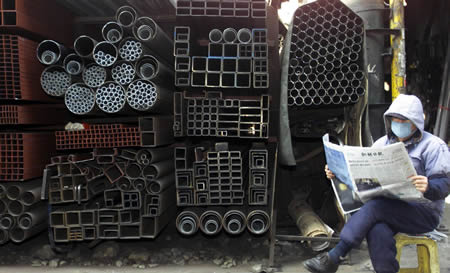| Standard-Bearer Breaks Standards |
| http://www.sina.com.cn 2003/12/11 14:15 Beijing Review |
 By WANG YUSHENG The U.S. duties on imported steel introduced last March are inconsistent with international trade rules, the World Trade Organization (WTO) appellate body ruled on November 10. It ordered the United States to cancel the safeguard measures within a month; otherwise, it said, the complainants—including the European Union—have just reason to adopt retaliatory measures against imports from the United States. The U.S. safeguard measures for its steel production have impacted many other countries’export of steel products. The recent WTO decision simply upheld and reaffirmed findings from a July ruling that said the U.S. duties break WTO rules. The U.S. introduction of the three-year duties on steel of up to 30 percent last March aroused strong protest in the international community. Many countries, including EU nations, Japan, the Republic of Korea, Australia, Russia and China, followed to accuse the United States of violating WTO rules. Even British Prime Minister Tony Blair claimed that the decision made by the Bush administration was unreasonable and wrong. But the U.S. side clang to its decision regardless of criticism throughout the international community. U.S. Trade Representative Robert Zoelick argued that U.S. duties on imported steel are legal and sensible based on a variety of reasons. As a result, the EU, Japan, the Republic of Korea, Brazil, Switzerland, Norway, New Zealand and China jointly filed a complaint with the WTO. At that time, the U.S. safeguard measures became a top concern of many diplomats from APEC developing member nations. One diplomat asked,“Isn’t the United States supposed to be the standard-bearer of world free trade?”The United States has always preached that trade liberty is the only logical path for economic development, and that trade protectionism has no future. It was trying to break the standards it has set, he said. The United States lost the suit and its position as a superpower that represents free trade. However, it still didn’t give in to the WTO appellate body’s ruling, saying only that it would study the decision carefully. Just eight days later, Washington announced a plan to impose quotas on three types of textile products that it imports from China. On November 5, U.S. Commerce Secretary Don Evans published an article entitled“American Plays Fair. Does China?”in the Wall Street Journal. The article said that the United States has always fully advocated free trade and fair competition, while calling China to lift its trade barriers. He argued that the United States has just cause to bring violations of current WTO rules it finds to its trading partners. This is ridiculous, reminiscent of a burglar yelling,“Stop thief.” The Evans article and America’s rhetoric about trade disputes with China can be partially attributed to the Bush administration’s need to win over the voters involved with the nation’s steel industry in the run up to the presidential election, according to some U.S. media reports. And American newspapers criticize that these actions set a very bad precedent. The United States is in a predicament. If it accepts the WTO ruling it will lose its position as a free-trade standard bearer. Moreover, the compromise might also affect George W. Bush’s popularity in three big steel producing states. If it refuses to accept the ruling, other WTO member nations may retaliate, possibly sparking a trade war across the Atlantic. And states that suffer from retaliatory sanctions will certainly complain. International economic cooperation relies on commonly held fundamental principles—fair play and just decision making. The United States should abide by the just decision of the WTO, an organization that America has chosen to regulate free and fair world trade. |
| 【英语学习论坛】【评论】【大 中 小】【打印】【关闭】 |